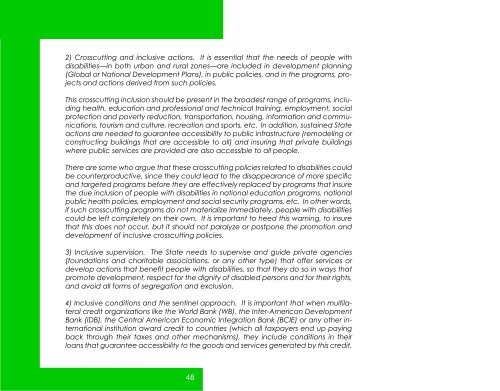in English - Handicap International
in English - Handicap International
in English - Handicap International
You also want an ePaper? Increase the reach of your titles
YUMPU automatically turns print PDFs into web optimized ePapers that Google loves.
2) Crosscutt<strong>in</strong>g and <strong>in</strong>clusive actions. It is essential that the needs of people with<br />
disabilities—<strong>in</strong> both urban and rural zones—are <strong>in</strong>cluded <strong>in</strong> development plann<strong>in</strong>g<br />
(Global or National Development Plans), <strong>in</strong> public policies, and <strong>in</strong> the programs, projects<br />
and actions derived from such policies.<br />
This crosscutt<strong>in</strong>g <strong>in</strong>clusion should be present <strong>in</strong> the broadest range of programs, <strong>in</strong>clud<strong>in</strong>g<br />
health, education and professional and technical tra<strong>in</strong><strong>in</strong>g, employment, social<br />
protection and poverty reduction, transportation, hous<strong>in</strong>g, <strong>in</strong>formation and communications,<br />
tourism and culture, recreation and sports, etc. In addition, susta<strong>in</strong>ed State<br />
actions are needed to guarantee accessibility to public <strong>in</strong>frastructure (remodel<strong>in</strong>g or<br />
construct<strong>in</strong>g build<strong>in</strong>gs that are accessible to all) and <strong>in</strong>sur<strong>in</strong>g that private build<strong>in</strong>gs<br />
where public services are provided are also accessible to all people.<br />
There are some who argue that these crosscutt<strong>in</strong>g policies related to disabilities could<br />
be counterproductive, s<strong>in</strong>ce they could lead to the disappearance of more specific<br />
and targeted programs before they are effectively replaced by programs that <strong>in</strong>sure<br />
the due <strong>in</strong>clusion of people with disabilities <strong>in</strong> national education programs, national<br />
public health policies, employment and social security programs, etc. In other words,<br />
if such crosscutt<strong>in</strong>g programs do not materialize immediately, people with disabilities<br />
could be left completely on their own. It is important to heed this warn<strong>in</strong>g, to <strong>in</strong>sure<br />
that this does not occur, but it should not paralyze or postpone the promotion and<br />
development of <strong>in</strong>clusive crosscutt<strong>in</strong>g policies.<br />
3) Inclusive supervision. The State needs to supervise and guide private agencies<br />
(foundations and charitable associations, or any other type) that offer services or<br />
develop actions that benefit people with disabilities, so that they do so <strong>in</strong> ways that<br />
promote development, respect for the dignity of disabled persons and for their rights,<br />
and avoid all forms of segregation and exclusion.<br />
4) Inclusive conditions and the sent<strong>in</strong>el approach. It is important that when multilateral<br />
credit organizations like the World Bank (WB), the Inter-American Development<br />
Bank (IDB), the Central American Economic Integration Bank (BCIE) or any other <strong>in</strong>ternational<br />
<strong>in</strong>stitution award credit to countries (which all taxpayers end up pay<strong>in</strong>g<br />
back through their taxes and other mechanisms), they <strong>in</strong>clude conditions <strong>in</strong> their<br />
loans that guarantee accessibility to the goods and services generated by this credit.<br />
48

















